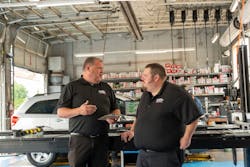Making it to the top isn’t easy.
That’s especially true in the franchise structure, which makes up so many brands in NOLN’s annual TOPS in the Industry* list. Success depends on a strong brand at the top and the determination of each franchise owner at the unit level.
Steve Isom knows what the work is like. He’s been building quick lube networks for three decades. His current franchise, Stonebriar Auto Services, has plans for 150 Jiffy Lube Multicare shops within five years.
Growth is the name of the game in quick maintenance, whether you’re looking at 20 shops or two.
“That’s big,” Isom says. “When you go to two, you just doubled your business. Nobody can diminish that.”
TOPS shows the final numbers—where the biggest brands stack up with regional and nationwide shop networks. In this story, take a look at the individual efforts that go into making each brand part of a growing industry.
You’ll find that success across the industry has many different stories with a lot in common.
Extensive Groundwork
Steve Isom
Overall Brand: Jiffy Lube Multicare
TOPS Rank: 1
Stores in this Franchise: 30
The goal is clear and ambitious for Isom’s outfit.
“We’re planning on having around 150 stores in a five-year period,” he says. “So it’s a pretty aggressive growth strategy.”
The company opened its first 29 stores over eight months in a pandemic-shrouded 2020, and the company doesn’t look to slow down its momentum with mostly new construction of Jiffy Lube Multicare shops.
This kind of growth trajectory wasn’t an accident. It required a lot of planning and time before the first store went up. Relying on his experience, Isom and his team spent 21 months making plans for a franchise that could be deployed quickly and effectively—all before the first store went online.
“So everything we were doing in the very beginning, before we were opening stores, was all knowing we were going to be opening stores quickly and spread out, and how we could deliver a high level of service for our customers,” Isom says.
Proper Partnerships
During that planning phase, Isom and his team laid the groundwork for a quick growth plan. That meant examining every part of the business and making sure it was ready for that level of change with Stonebriar’s large geographic area. The company has plans to reach 13 states by the end of 2021.
One of the first items of business was finding vendor partners who could keep up with that growth.
“With us having a spread out-footprint, you could end up with a million different vendors, suppliers all over,” he says. “The first thing was that everybody we work with has got to be a national provider that reaches every one of our current and future locations.”
Having a vendor that works with Stonebriar’s scale allows Stonebriar personnel to focus more on hiring and training rather than managing multiple accounts.
Road Warrior
It’s not unusual for Stonebriar to have multiple openings of new stores in one day. Anticipating this, it was key to make sure the store-level preparation went as smoothly as possible.
When Isom and his colleagues worked to streamline the setup procedure for the new stores, they reexamined some tasks that are necessary, but time-consuming. That’s the process of setting up equipment, software, tools, and inventory.
The solution was to designate someone who could handle those tasks for each location with the help of vendor assistance.
“The way we do it is turnkey. We have all that done with one internal person and our vendor partners to do that,” he says. “So our store managers, district managers, they’re walking into stores hiring and training and nothing else.”
Before you know it, the store-level manager is focusing on customer care and not troubleshooting software.
Accountability in Action
Gregg Gaskins
Overall Brand: Express Oil Change and Tire Engineers
TOPS Rank: 10
Stores in this Franchise: 7
Gregg Gaskins was a professional in the medical device industry before getting into auto maintenance and repair.
When he did jump into the industry, he made a big splash in his South Carolina market, growing a successful regional network of shops and building a community service reputation as well. His company, which operates, which has had a successful run of its own.
“We’ve been at it 15 years as Express Oil Change and Tire Engineers, fundraising annual donations to local food shelves,” he says. “And it’s absolutely been an interesting and successful ride.”
As the franchise owner, Gaskins has been able to shift day-to-day duties to trusted managers while maintaining the strong values that got the business off the ground in the first place.
Set the Standard
Gaskins started with a single store in Columbia, S.C. He worked as the store manager there for two years and became a successful leader in the industry.
“And then we opened up a second one, and I was store manager there for approximately two years,” he says. “Once we got the third store, then I started to step out of the day-to-day and focus more on development.”
That can be a tough transition for operators who have put all their effort into the processes and culture that made the first couple of locations grow. In Gaskins’ case, that transition came quickly in 2011, when the company opened stores three and four within a couple months of each other.
“The biggest thing for me was making sure that your culture and your core values, your message was getting down to the troops,” he says. “That was the most difficult thing to make sure was happening.”
His solution might sound obvious: meetings. What Gaskins made sure happened was that meetings had a rigid schedule, so they were sure to happen. Each meeting had an agenda, so that important topics were always covered.
Without that regular format, it can be easy for meetings to become too casual, with missed opportunities to focus on important (or sometimes thorny) topics. Sticking to a format means accountability is part of the process.
“Everybody is being held accountable to their peers and to our director of operations,” Gaskins says.
Building HQ
One tough part of growth is when an operator gives up the day-to-day duties at the shop. Then the operator starts to build a headquarters, which starts to see its own growth spurt. Depending on the operation, the leader has to determine when to add centralized services, like accounting, human resources, and operational support.
Knowing when to do so can be tough as well.
“We evaluated each position and when it made sense,” Gaskins says. “In some cases, we might have pulled the trigger too early and in other cases maybe too late. But when we found there was a need and found that we could solve some problems, we decided to move in a different direction.”
Once that central office position is added, the benefits can be seen almost immediately. Gaskins’ franchise added a human resources position less than a year ago, and he says it boosted their hiring.
That HR professional does employee pre-screening and initial interviews, among other duties. The position proved valuable as the company looks to grow more.
“We’ve really stepped up our recruiting efforts, full-time recruiting and training,” he says. “So that’s been really good timing.”
Investments that Matter
Brian Morrison
Overall Brand: SpeeDee Oil Change and Auto Service and Grease Monkey
TOPS Rank: 13
Stores in this Franchise: 8
Brian Morrison’s network of SpeeDee Oil Change and Auto Service shops started with what he calls a “diamond in the rough.”
It was the original shop he purchased in 2019, which came after he spent 20 years in leadership positions with another quick lube company.
That first shop in Spartanburg, S.C., had two employees and a manager. Now it has 14 employees and more than three times the monthly sales.
“I go into it with the thought process of investing back into the business until it stops growing,” Morrison says. “And find out what it truly can do if it has unlimited resources.”
Prepare for Growth
Like the other operators in this story, Morrison started his franchise with plans for growth. In his previous job, he oversaw as many as 40 shops.
Like Gaskins, Morrison started as the day-to-day manager at the first location. He wanted the computer consoles arranged in the most effective way and the transmission flush machine in the most accessible spot. As the network grew, he empowered his managers to take on certain duties.
“It was hard at first,” Morrison says. “Those first few weeks and months were a challenge. If you hire the right people and put the right people in charge, they kind of push you out. Like, ‘Hey boss, I got this.’”
The right managers will thrive with the opportunity to take on responsibilities. Morrison says that it’s a great feeling to see those managers take the reins and reinforce your decision.
“And as they took care of it and demonstrated the capacity to take care of it, you gain confidence that they can and it’s the right thing to do,” he says. “If you’re going to grow, you have to put people in place that you trust to run it in your absence.”
There’s one factor that needs to be in place for this to work, according to Morrison. The shops need to be well-staffed.
People in Place
Morrison doesn’t like to see operators become complacent with a low car count, particularly without making an investment in labor that can make a real difference.
It can be hard for an operator to spring for that extra overhead, but he says an anti-growth mindset can creep into the picture.
“I’ve seen a lot of what people call the death spiral,” he says. “As car counts decrease, they reduce staff. And because car counts decrease, they reduce staff again. And so they have this bare minimum of three employees working during any given time, and maybe a total of four or five at the entire shop.”
Budget for healthy staff numbers. That’s staffing for growth, Morrison says. The best staff level might vary depending on the shop size, market, and potential. But search for the ceiling with staffing, not the minimum.
“I kept adding people until adding people didn't help,” he says. “I just kept adding people until the customer count didn’t grow because of that.”
Staffing is a big part of the puzzle, but it’s not the only factor. Operators need to make sure their operational processes are detailed and dictated down to each and every tech. They need to hold managers accountable with regular check-ins, and they need to exert their leadership talents where they’re able.
That’s how the brands in the TOPS list made it to those levels. It’s thanks to the individual successes of owners like Isom, Gaskins, and Morrison.
“I don't know what the total number endgame looks like,” Morrison says. “I just know that it’s easy. It’s fun. It’s rewarding. So right now, I don’t see an end in sight.”
*Thanks to Valvoline for sponsoring this year's TOPS in the Industry list. The list appears in the July print issue of NOLN and online here.
About the Author
Matt Hudson
Content Director
Matt Hudson is the former content director for National Oil and Lube News.

